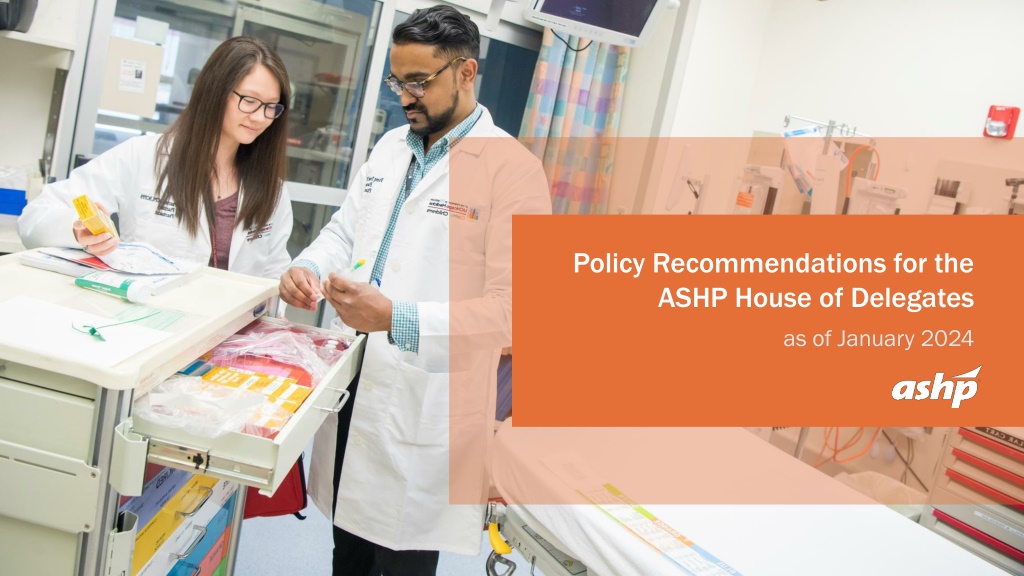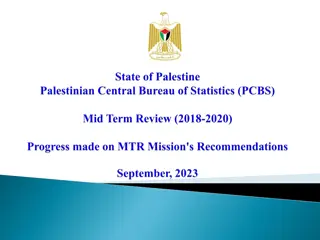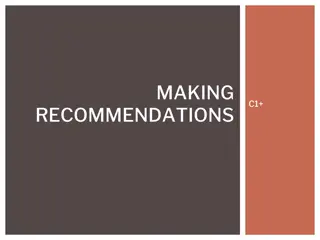ASHP Policy Recommendations for Mental Health Improvement
The ASHP House of Delegates holds authority over professional policies, with virtual and in-person meetings to consider proposals. The upcoming March Virtual House of Delegates will address policies promoting equitable access to mental healthcare services and emphasizing the role of pharmacists in mental health awareness and treatment. Delegates are encouraged to engage in discussions and review proposed policies on the ASHP platform to influence decision-making.
Download Presentation
Please find below an Image/Link to download the presentation.
The content on the website is provided AS IS for your information and personal use only. It may not be sold, licensed, or shared on other websites without obtaining consent from the author. Download presentation by click this link. If you encounter any issues during the download, it is possible that the publisher has removed the file from their server.
Presentation Transcript
Policy Recommendations for the ASHP House of Delegates as of January 2024
The House of Delegates Ultimate authority over ASHP professional policies One annual session consisting of 2 in-person meetings at the June House of Delegates and 3 virtual meetings (March, May, and November) The House considers professional policy proposals that have been approved by the Board of Directors Most of these professional policy proposals are contained in reports from ASHP councils but may come from other component bodies, delegates, or ASHP members
March Virtual House of Delegates The policy recommendations in the following slides are scheduled to be considered at the March virtual House of Delegates. If any of those policy recommendations are not approved, they will be considered at the June House meeting. Proposed policies are found on the House of Delegates website and are debated on the ASHP House of Delegates Connect community by delegates and other ASHP members. It is important to review the Board Reports on Policy Recommendations for each meeting (found on the House of Delegates website) because that report provides a rationale and background information not found on ASHP Connect. All ASHP members, including delegates, are encouraged to use the ASHP House of Delegates Connect community to review and comment on any of the proposed policies. Web-based discussion in advance of a House meeting may influence how delegates vote, and it also permits delegates to discuss potential amendments before the June House.
CPhP: Role of the Pharmacy Workforce in Improving Mental Health (March) To advocate for equitable and destigmatized access to mental healthcare services for all patients across their lifespan, including members of the healthcare workforce; further, To affirm the essential role of pharmacists, as members of the interprofessional care team, in increasing patient access to mental healthcare services; further, To urge all members of the pharmacy workforce to raise awareness of, screen for, triage, and provide education on mental health conditions; further, To advocate for expansion of mental health-related comprehensive medication management services provided by pharmacists; further, To advocate for adequate funding of mental health awareness programs and for funding that promotes equitable access to mental healthcare services.
CPhP: Independent Prescribing Authority (March) To affirm that prescribing is a collaborative process that includes patient assessment, understanding of the patient s diagnoses, evaluation and selection of available treatment options, monitoring to achieve therapeutic outcomes, patient education, and adherence to safe and cost-effective prescribing practices; further, To recognize that pharmacists are highly trained medication experts on the interprofessional care team capable of making independent and autonomous evidence-based decisions on medication therapy management; further, To advocate that pharmacists have independent and autonomous authority to initiate, modify, and deprescribe all schedules and classes of medications; further, To advocate that healthcare delivery organizations establish credentialing and privileging processes for pharmacists that delineate scope of practice, support pharmacist prescribing, and ensure that pharmacists who prescribe are accountable, competent, and qualified to do so; further, To advocate that all pharmacists have a National Provider Identifier that is recognized by payers. Note: This policy would supersede ASHP policies 2236 and 2251.
CPhP: Suicide Awareness, Prevention, and Response (March) To support the goal of zero suicides; further, To collaborate with key stakeholders in support of suicide awareness, prevention, and response; further, To acknowledge that optimal suicide awareness, prevention, and response efforts focus both on patients and on the healthcare workforce; further, To recognize that pharmacists, as key members of the interprofessional care team, are integral to suicide awareness, prevention, and response efforts, and to acknowledge the vital role of other members of the pharmacy workforce in those efforts; further, To foster the use and development of clinically validated tools to aid the pharmacy workforce in assessing the influence of medications and other factors on suicidality; further, To advocate for adequate government and healthcare organization funding for suicide awareness, prevention, and response; further, To enhance awareness of local, state, national, and global suicide awareness, prevention, and response resources. Note: This policy would supersede ASHP policy 1901.
CPhP: Pharmacists Role on Ethics Committees (March) To advocate that pharmacists should be included as members of, or identified as a resource to, hospital and health-system ethics committees; further, To encourage pharmacists to actively seek ethics consultations or solicit input from their institution s ethics committee, as appropriate; further, To encourage pharmacists serving on ethics committees to seek advanced training in healthcare ethics. Note: This policy would supersede ASHP policy 1403.
CPhP: Safe Handling and Administration of Hazardous Drugs (March) To advocate that pharmaceutical manufacturers eliminate surface contamination on packages and vials of hazardous drugs (HDs); further, To inform pharmacists and other personnel of the potential presence of surface contamination on the packages and vials of HDs; further, To advocate that all healthcare settings proactively conduct an interprofessional assessment of risk for exposure to HDs during handling and administration, including the use of closed-system transfer devices (CSTDs); further, To advocate for pharmacist involvement in the development of policies, procedures, and operational assessments regarding administration of HDs, including when CSTDs cannot be used; further, To advocate that the Food and Drug Administration require standardized labeling and package design for HDs that would alert handlers to the potential presence of surface contamination, including development of CSTD-compatible, ready-to-administer HD products; further, To encourage healthcare organizations, wholesalers, and other trading partners in the drug supply chain to adhere to published standards and regulations. Note: This policy would supersede ASHP policies 1615 and 1902.
CPuP: Order Verification (March) To advocate that a prescriber should not be solely responsible for medication ordering, dispensing, and administration as well as any patient monitoring and evaluation, except when a double check would limit patient access to care.
CPuP: Liability Protection (March) To advocate that pharmacists be able to provide evidence-based dispensing and care to patients without fear of criminal or civil legal consequences, harassment, or liability; further, To advocate that protection against liability extend to referrals for out-of-state care and for dispensing to patients from another state.
CPuP: State Prescription Drug Monitoring Programs (March) To support continued state implementation of prescription drug monitoring programs that collect real-time, relevant, and standard information from all dispensing outpatient entities about controlled substances and monitored prescriptions; further, To advocate that such programs seek adoption into health information exchanges to best integrate into electronic health records and to allow prescribers, pharmacists, and other practitioners to proactively monitor data for appropriate assessment and dispensing; further, To advocate that such programs improve their interstate data integration to enhance clinical decision-making and end-user satisfaction; further, To encourage policies that allow practicing pharmacists to gain access to databases without holding licensure in each state; further, To promote research on the effects of prescription drug monitoring programs and electronic health record programs on opioid prescribing, dispensing, misuse, morbidity, and mortality. Note: This policy would supersede ASHP policy 1408.
CPuP: Emergency Supplies of Drug Products (March) To discontinue ASHP policy 1906, Emergency Supplies of Drug Products, which reads: To advocate for states to allow any pharmacist, during a declared emergency, to dispense without a prescription an emergency supply of a drug product in quantities that meet the needs of patients.
CPuP: Drug Nomenclature (March) To discontinue ASHP policy 9011, Drug Nomenclature, which reads: To work with the FDA, USP, and pharmaceutical industry to assure that drug products are named in a manner that clearly and without confusion permits identification of ingredients strengths and changes.
COT: Medication Stewardship Programs (March) To advocate that pharmacists are foundational members of any medication stewardship program; further, To affirm that pharmacists bring unique clinical, operational, safety, and financial expertise to help organizations develop and manage medication stewardship programs; further, To promote pharmacist leadership in medication stewardship teams; further, To encourage healthcare organizations to develop comprehensive medication stewardship programs that align with applicable laws, regulations, and accreditation standards; further, To support incorporation and development of the pharmacy workforce in medication stewardship efforts; further, To enhance awareness that medication stewardship includes disease state management across all levels of care and addresses barriers at the patient and system levels in order to improve the quality, safety, and value of patient care.
COT: Nonprescription Status of Rescue and Reversal Medications (March) To support the over-the-counter (OTC) status of medications intended for evidence-based rescue use or reversal of potentially fatal events; further, To work with federal, state, and local governments and others to improve the rescue and reversal medication development and supply system to ensure an adequate and equitably distributed supply of these medications; further, To advocate that all insurers and manufacturers maintain coverage and limits on out-of-pocket expenditure so that patient access to rescue and reversal medications is not compromised; further, To support and foster standardized education and training on the role of rescue and reversal medications and their proper administration, safe use, and appropriate follow-up care.
COT: Research on Drug Use in Obese Patients (March) To discontinue ASHP policy position 1920, Research on Drug Use in Obese Patients, which reads: To encourage drug product manufacturers to conduct and publish pharmacokinetic and pharmacodynamic research in obese patients to facilitate safe and effective dosing of medications in this patient population, especially for medications most likely to be affected by obesity; further, To encourage manufacturers to include in the Food and Drug Administration (FDA) approved labeling detailed information on characteristics of individuals enrolled in drug dosing studies; further, To advocate that the FDA develop guidance for the design and reporting of studies that support dosing recommendations in obese patients; further, To advocate for increased enrollment and outcomes reporting of obese patients in clinical trials of medications; further, To encourage independent research on the clinical significance of obesity on drug use, as well as the reporting and dissemination of this information via published literature, patient registries, and other mechanisms; further, To recognize that pharmacists are medication therapy experts who should provide guidance on appropriate drug dosing for obese patients.
COT: Therapeutic Interchange (March) To discontinue ASHP policy 8708, Therapeutic Interchange, which reads: To support the concept of therapeutic interchange of various drug products by pharmacists under arrangements where pharmacists and authorized prescribers interrelate on the behalf of patient care.
CEWD: Flexible Workforce Models (March) To advocate for flexible workforce models that promote patient safety and continuity of care, optimize pharmacy operations, and enhance recruitment and retention of the pharmacy workforce.
CEWD: Pharmacy Residency Training (March) To continue efforts to increase the number of ASHP- accredited pharmacy residency training programs and positions available; further, To promote efforts to increase recruitment and retention of residents in ASHP-accredited pharmacy residency programs; further, To encourage stakeholders to evaluate priority areas within pharmacy for future residency training needs. Note: This policy would supersede ASHP policy 0917.
CPM: Pharmacist Access to Provider Networks (March) To advocate for laws and regulations that require healthcare payers to include pharmacists in their provider networks as standard coverage when providing patient care services within their scope of practice and the services are covered benefits; further, To advocate that payers provide comparative, transparent sharing of performance and quality measure data for all providers in their networks, including pharmacists. Note: This policy would supersede ASHP policy 2134.
CPM: Risk Assessment of Health Information Technology (March) To urge hospitals and health systems to directly involve departments of pharmacy in performing appropriate risk assessment before new health information technology (HIT) is implemented or existing HIT is upgraded, and as part of the continuous evaluation of current HIT performance; further, To advocate that HIT vendors provide estimates of the resources required to implement and support new HIT; further, To collaborate with HIT vendors to encourage the development of HIT that improves patient-care outcomes and user experience; further, To advocate for changes in federal law that would recognize HIT vendors safety accountability. Note: This policy would supersede ASHP policy 1418.
CPM: Unit Dose Packaging Availability (March) To advocate that pharmaceutical manufacturers provide all medications used in health systems in unit dose packages or, when applicable, in packaging that optimizes medication safety, improves operational efficiency, and reduces medication waste; further, To urge that the Food and Drug Administration require pharmaceutical manufacturers to provide stability data to support the repackaging of medications outside of their original manufacturer bulk containers in the interest of public health, healthcare worker and patient safety, and reduced waste. Note: This policy would supersede ASHP policy 2253.
CPM: Optimizing the Medication-Use Process (March) To discontinue ASHP policy 9903, Optimizing the Medication-Use Process, which reads: To urge health-system pharmacists to assume leadership, responsibility, and accountability for the quality, effectiveness, and efficiency of the entire medication-use process (including prescribing, dispensing, administration, monitoring, and education) across the continuum of care; further, To urge health-system pharmacists to work in collaboration with patients, prescribers, nurses, and other health care providers in improving the medication-use process.
May or June House of Delegates Meetings The policy recommendations in the following slides are scheduled to be considered at the May or June meetings of the House of Delegates. If any of the policy recommendations from the March virtual House of Delegates meeting are not approved, they will be considered at the June House meeting. Proposed policies are found on the House of Delegates website and are debated on the ASHP House of Delegates Connect community by delegates and other ASHP members. It is important to review the Board Reports on Policy Recommendations for each meeting (found on the House of Delegates website) because that report provides a rationale and background information not found on ASHP Connect. All ASHP members, including delegates, are encouraged to use the ASHP House of Delegates Connect community to review and comment on any of the proposed policies. Web-based discussion in advance of a House meeting may influence how delegates vote, and it also permits delegates to discuss potential amendments before the June House.
CPhP: Prehospital Management of Medications (May/June) To assert that variation in the prehospital management and use of medications is a risk to patient safety and continuity of care; further, To advocate for pharmacy workforce involvement in clinical and operational decision-making for prehospital management and utilization of medications; further, To encourage the pharmacy workforce to assume responsibility for medication-related aspects of ensuring the continuity of care as patients transition from prehospital care to other care settings; further, To collaborate with stakeholders involved in prehospital medication- use cycle decisions to improve patient safety, minimize variation, and reduce inefficiencies.
CPhP: Role of Artificial Intelligence in Pharmacy Practice (May/June) To recognize artificial intelligence (AI) as a tool with tremendous potential to improve patient care and the medication-use process, which should be implemented with caution due to potential unforeseen risks; further, To encourage healthcare organizations to develop policies, procedures, and guidelines to determine which care settings, medications, and patient populations are appropriate candidates for the use of AI; further, To advocate for pharmacy workforce involvement and transparency in the decision- making, design, implementation, and ongoing evaluation of AI-related applications and technologies that affect medication-use processes and tasks; further, To oppose any use of AI that compromises human interaction or replaces ethical decision-making, professional judgment, or critical thinking or is implemented solely to reduce healthcare staffing and resources; further, To advocate for regulations and standards that permit the use of AI in circumstances in which it has proven safe and effective.
COT: Testing for Pregnancy Status (May/June) To affirm that pregnancy testing should occur only with informed consent and only when the test results would change medical management; further, To affirm that a positive pregnancy test should not compromise the integrity of evidence-based, patient- centered care.
COT: 5-HT2Agonist, Entactogen, and Empathogen (Psychedelic) Assisted Therapy (May/June) To recognize that psychedelic-assisted therapy (PAT) has demonstrated therapeutic potential and should be further researched; further, To recognize that in PAT there is not a standardized product subject to the same regulations as a prescription drug product, and to support the development of standardized formulations of psychedelics that would provide consistent potency and quality; further, To encourage state boards of pharmacy, regulatory agencies, and safety bodies with an interest in PAT to promote research best practices and regulatory standards for medication preparation, compounding, and administration to ensure safety and quality; further, To advocate that when psychedelics are used for PAT, healthcare providers, including pharmacists, should assess patients for medical, pharmacologic, and psychosocial contraindications prior to use and provide medical assistance as needed.
CEWD: Opposition to Pharmacy Jurisprudence Examination Requirement (May/June) To advocate the removal of a standalone examination of federal or state pharmacy law as a requirement for licensure; further, To advocate that employers provide initial and ongoing education of the pharmacy workforce on pertinent federal and state pharmacy laws; further, To acknowledge that it is a professional obligation of a pharmacist to practice in compliance with federal and state laws.
CEWD: Pharmacy Technician Education Requirements (May/June) To recognize that highly trained and skilled pharmacy technicians working in advanced roles regularly perform complex and critical medication-use procedures, and that a safe and effective medication-use process depends significantly on the skills, knowledge, and competency of those pharmacy technicians to perform those tasks; further, To reaffirm that all pharmacy technicians should complete an ASHP-accredited training program, be certified by the Pharmacy Technician Certification Board, and be licensed by state boards of pharmacy; further, To advocate that beyond those requirements, pharmacy technicians working in advanced roles should complete at a minimum an associate of science degree and demonstrate ongoing competencies specific to the tasks to be performed; further, To advocate that expansion of pharmacy technician duties into expanded, advanced roles should include consideration of potential risk to patients and that ongoing quality assurance metrics should be established to assure patient safety. Note: This policy would supersede ASHP policy 1203.
CPM: Supporting High Reliability in Pharmacy Practice (May/June) To state that a commitment to the principles and science of high reliability, with the goals of zero medication errors and zero harm, are foundational to pharmacy excellence; further, To encourage hospitals and health systems to commit to high- reliability principles; further, To encourage research that informs the creation of best practices in high reliability and progress toward implementation of high-reliability principles in all pharmacy services.
CPM: Documentation of Patient-Care Services in the Permanent Health Record (June) To advocate for public policies that support documentation of patient-care services provided by the pharmacy workforce in the permanent patient health record; further, To promote inclusion of the pharmacy workforce in organization- based credentialing and privileging processes and in collaboration with an organization s clinical informatics team to ensure accurate and complete documentation of the care provided to patients and to validate the impact of patient care provided by the pharmacy workforce on patient outcomes and cost of care; further, To advocate that electronic health records be designed with a common documentation space to accommodate all healthcare team members and support the communication needs of pharmacy.
Questions or Suggestions? Feel free to contact: Melanie Dodd, Chair, ASHP House of Delegates: hodchair@ashp.org ASHP policy website: https://www.ashp.org/Pharmacy-Practice/Policy- Positions-and-Guidelines/

















































